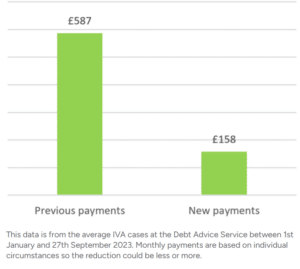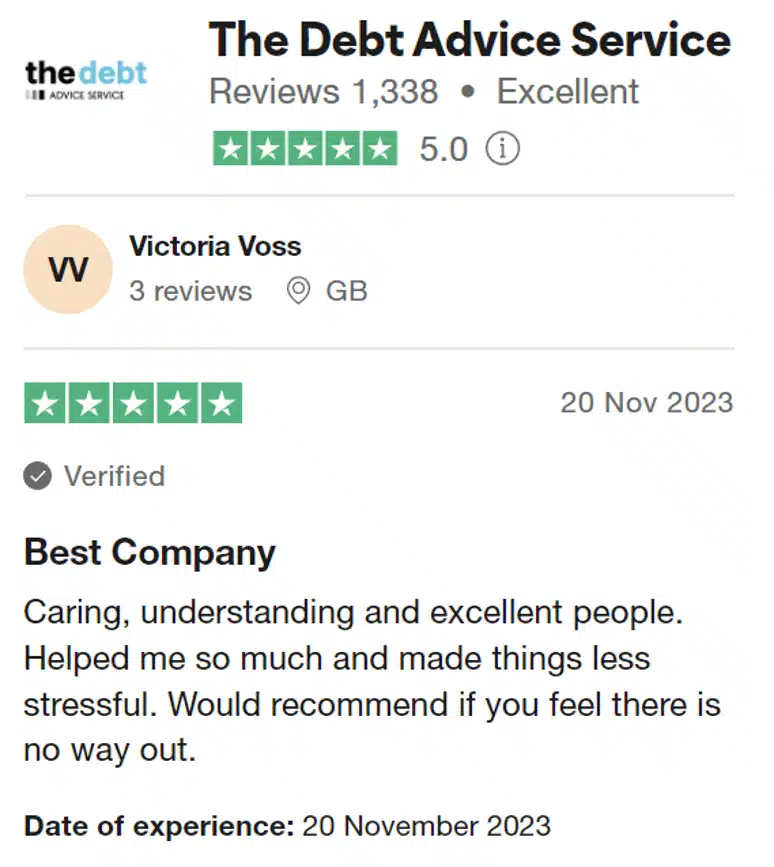Have you been contacted by a debt collection agency? Don’t worry; you’re not alone! Each month, over 12,000 people visit this site seeking advice on debt matters.
In this easy-to-understand guide, we’ll address the following questions:
- How does debt collection work?
- What’s the difference between a debt collection agency and bailiffs?
- How can you tell if a debt collector is legitimate?
- Will the debt collection agency add more interest and charges?
- Can debt collectors enter your home?
- Can you be sent to jail for not paying the debt?
We know that dealing with debt can be tough; some of us have been in your shoes. With our experience, we’ll help you understand how to beat debt collectors.
Let’s get started!
What is debt collection?
Debt collection involves a company contacting you to recover outstanding debts that you owe. In short, when you fail to repay a loan, credit card or creditor/lender, a debt recovery company will contact you to collect on the debt.
How Does Debt Collection Work?
Debt collection works in several ways. A debt recovery company could contact you by phone, email, text or in writing by letter. If you’re a delinquent borrower, you’d receive payment demands and threats of court action from them.
What is a debt collection agency?
Debt collection agencies specialise in recovering outstanding debts on behalf of their customers. However, the collection recovery company may have purchased a debt portfolio in which case, they own the debts.
What’s the difference between a debt collection agency and enforcement officers (bailiffs)
A debt collection company’s powers are limited. In short, they are the same as that of an original lender/creditor. Enforcement officers, on the other hand, have the legal power to collect a debt that’s owed.
They can’t seize your possessions whereas an enforcement officer can!
How much do debt collectors charge?
Debt collectors can charge anything from £40 to just under £1,000 to recover outstanding debts for them. However, they can charge even more if a debt collection company can prove an amount doesn’t cover reasonable costs for recovering a debt.
Are debt collection agencies legal?
Yes. Sadly, debt collection agencies are legal but they must follow the law when recovering debts. They must also abide by the Credit Association Services (CSA) code of practice which prevents them from doing specific things.
How can I tell if a debt collector is legitimate?
The best way to tell if a debt recovery company is legitimate or not is to visit the Credit Services Association (CSA) website.
You can check if the company is a member or not. When you get a phone call from a debt recovery company, ask them to prove who they are!
What happens when my debt is sold to a debt collection agency?
When your debt is sold to a collection agency, they own the debt. In short, you can no longer deal with the original lender/creditor.
However, a debt collection company’s powers are the same as those of the original lender/creditor.
How a debt solution could help
Some debt solutions can:
- Stop nasty calls from creditors
- Freeze interest and charges
- Reduce your monthly
A few debt solutions can even result in writing off some of your debt.
Here’s an example:
Situation
| Monthly income | £2,504 |
| Monthly expenses | £2,345 |
| Total debt | £32,049 |
Monthly debt repayments
| Before | £587 |
| After | £158 |
£429 reduction in monthly payments

If you want to learn what debt solutions are available to you, click the button below to get started.
How do debt collectors find you?
Debt collectors have all sorts of tracing tools at their disposal these days. They can use public record databases and search engines to track you down. However, they can also employ specialist ‘tracing’ agencies to find you!
How Much Do Debt Collectors Buy Debt for in the UK?
Debt collection companies buy debt portfolios for a fraction of their true value. They can pay as little as 10p in the pound for debts they buy depending on the value of the debt.
- How Smart Borrowing Can Save Your Family’s Budget
- Game Themed Games Nights Without the Risk of Real Gambling
- What is Debit Finance PLC IP on Bank Statement? Debt Scam?
- How Much Will Debt Collectors Settle For? UK Percentages
- Who Sent Me PO Box 300 Northampton NN1 2TX Debt Letter?
- Do I Pay or Ignore Bluestone Debt Collection and Recovery?
- Should I Pay Orbit Debt Collection for Water or Ignore?
- Should I Pay or Ignore ACI Debt Collectors?
- Intrum Debt Collection Chasing Old Debt? What Are Your Rights?
- What is LC Asset 2 SARL in my Bank Account? Debt Scam?
- Should I Pay or Ignore Asset Link Capital Debt Collection?
- Do I Pay or Ignore C.A.R.S Debt (Credit Link Account Recovery)?
- Should I Pay or Ignore my Debt with TNC Collections?
- Moorcroft Debt Recovery Settlement Figure – How Much To Offer?
- What is eui ltd prem tr on my Bank Statement? Debt Warning
- Resolvecall Doorstep Visit from Bailiffs? Debt Collection Rules
- Should I Pay Lowell Portfolio 1 Ltd Debt Collectors?
- Who is Newlands House, Caxton Way, Eastfield Scarborough?
- Who is Elderbridge re: HCA Direct Debit and Should I Cancel?
- Should I Pay DRS Debt Collection (Debt & Revenue Services)?
- BPO Collections for HMRC Debt – Warning Not To Ignore
- Do I Have to Pay Overdales Debt? CCJ Warning
- Can Debt Collectors Find My New Address in the UK?
- Who Sent Me PO BOX 795 Telford TF7 9GG Debt Letter?
- Should I Pay JC International Acquisition LLC Debt Collection?
- Who Sent Me PO Box 140 Normanton WF6 1YA Debt Letter?
- Shop Direct Finance Company Ltd on My Credit Report! Answer
- Who Sent Me PO Box 8743 Bellshill Debt Letter?
- How Much Do Debt Collectors Buy Debt for in the UK?
- Do I Pay LCS Debt Recovery? HMRC and Other Debts
- Is CDER Group Legitimate or a Scam? Can They Force Entry?
- Do I have to pay IMFS Debt Collection?
- Do I have to pay Opos Limited Debt Collection?
- Free Prove It Letter Template – Don’t Pay Up Yet!
- Should I pay Creditlink Account Recovery Solutions Debt?
Will the debt collection agency add more interest and charges?
Chances are that a debt collection company may try to add interest and fees to a debt which can be challenged. In theory, an original creditor/lender would stop adding interests and fees to a debt when an account falls into default.
What To Do When A Bill Goes To A Debt Collection Agency
When a lender or creditor sends your bill to a debt collection company, that’s it, you’ll have to deal with the debt collector.
You should find out two things when this happens. First, is it too old to enforce? Second, is the debt yours?
What will most debt collectors settle for?
The amount a debt collector might accept depends on the value of the debt. They’ll also factor in how much you’ve been paying every month to resolve the debt.
They may accept a settlement amount of between 30% and 70% depending on the debt collection company!
What can a debt collector do?
A debt collector has the right to contact you about an apparent outstanding debt. They can text you, email you, they can write to you and phone you. A debt collector also has the right to visit you at home.
In short, a debt collector can do exactly what an original lender/creditor can do and no more!
What can debt collectors take?
Debt collection agents can’t seize any of your possessions. Nor can they clamp any vehicles or seize items you own that you keep outside your house.
What are debt collectors not allowed to do?
The law in the UK together with the Credit Services Association code of conduct prevents debt collection agencies from doing and saying specific things.
For example, a debt collector can’t force their way into your home. Visit you at work and discuss an apparent debt with your employer.
Can I stop debt collectors from calling me?
No, you can stop debt collection agencies from calling you. But you can dictate when they can call you. Furthermore, you can tell them that you prefer to be contacted in writing rather than receiving phone calls.
Thousands have already tackled their debt
Every day our partners, The Debt Advice Service, help people find out whether they can lower their repayments and finally tackle or write off some of their debt.

Natasha
I’d recommend this firm to anyone struggling with debt – my mind has been put to rest, all is getting sorted.
Reviews shown are for The Debt Advice Service.
Will debt collectors visit my house?
Yes. A debt collection agent has the right to visit you at home. But they only typically come to your house if you didn’t respond to phone calls, letters, emails and texts.
What proof must a debt collector provide?
A debt collector must provide you with authenticated copies of a credit agreement or other type of contract you entered into with a creditor, lender or provider.
Can debt collectors enter my home?
No. A debt collection agent can’t enter your home. In fact, you shouldn’t open the door to them at all. You should speak to them through an open upstairs window or through the letterbox!
Can debt collectors visit me at work?
No. A debt collection agent can’t visit you at your place of work. Nor can they call you at work or speak to your boss about an apparent debt you owe.
What Should I Do if a Debt Collector Violates FCA Guidelines?
The first thing to do is lodge a complaint with the debt collection company. Then file a complaint with the Financial Ombudsman Services (FOS). The FOS should launch an investigation into your complaint.
How can I deal with debt collectors?
You should respond to a debt recovery company when they contact you. First, however, you should check the debt isn’t too old to enforce.
Second, you should ask the debt collector to prove the debt is yours. You should send them a ‘prove the debt letter’. It’s up to the debt collection company to prove you owe the money, not the other way around!
The debt isn’t mine – what can I do?
As mentioned, if the debt isn’t yours you can ask them to prove it is. Mistakes happen and debt collection agencies get it wrong by chasing the wrong person.
They must provide you with solid proof that you owe the money if they haven’t already.
Can I just ignore the debt collectors?
No. Although it’s really tempting to ignore a debt collection agency, it’s never a good idea. First, the debt won’t go away and neither will the debt recovery company!
You’ll just get more phone calls, letters, emails and texts demanding payment and threatening court action!
Do I have to pay a debt collection agency?
No, not unless the debt collection company has proved you owe the money and the debt isn’t statute barred.
However, you should try to pay the debt if you do owe the money and the debt is still current. Moreover, the sooner you enter into negotiations, the sooner all the stress and anxiety goes away.
That said, it’s always best to seek debt advice from one of the not-for-profit organisations before you admit, agree or sign anything.
What do I do if I can pay the money I owe?
If you can afford to pay the full amount owed, you should settle the debt as soon as you can. It’s the best way to get a debt collection company off your back!
What do I do if I cannot afford to pay the money back?
You should seek debt advice from one of the leading UK Charities if you can’t afford to pay back the money you owe.
Their advice could be invaluable when it comes to dealing with your debts when you’re struggling with your finances.
» TAKE ACTION NOW: Fill out the short debt form
Can debt collectors ask for proof of income?
No. You don’t have to give a debt collector any information about your income. However, they may decide to take you to court and could start adding interest and fees to the original debt.
Can debt collectors see your bank account balance uk?
A debt collector may ask the court to issue an order to obtain your bank balance details if they own the debt.
That said, a lender/creditor can also do the same. That said, without a court order, they can’t obtain information relating to your bank balance.
What happens if the debt collection agency refuses a payment plan?
You have the right to apply to a court and ask them to decide how much you pay if the debt collector refuses your payment plan.
What should you not say to a collection agency?
There are things you should never say to a debt collection company when they contact you.
For example, you should give them any personal financial information or promise to pay something towards the debt. This is known as a ‘good faith’ payment.
Neither should you admit owing the money or get angry when they contact you.
Can I be sent to jail for not paying the debt?
No. You can’t be sent to jail for not paying a debt. Not unless you committed fraud and it’s proven in court that you knowingly did.
The only exception is when you have council tax debts and you refuse to pay!
Is there a way to find out what debt collectors I owe?
Yes. You can check your credit reports from time to time to find out if you have a County Court Judgement (CCJ) for an unpaid debt.
Next, check your bank statements and check through your mail for any unopened letters demanding money from you!
I’m in a vulnerable situation – should I let the collection agency know?
Yes. You must let a debt collection company know you’re a vulnerable person. The majority of creditors/lenders show more empathy and understanding when they know you are vulnerable.
How do I complain about the debt collection agency?
You should first complain to the debt collection company if you believe they acted unlawfully.
Next, if they don’t deal with your complaint and continue to act in the same manner, you can report them to the Financial Ombudsman Services (FOS).
How does international debt collection work?
No laws actually exist for international debt collection. In short, the rules are those which apply to a debtor’s country.
That said, in some countries, some laws prevent foreign debt collectors from collecting money owed and from issuing court proceedings.
Can a Debt Collection Agency Take Me to Court?
Yes. If the debt collection bought the debt they now own it. Therefore, they can take you to court if you don’t pay what’s owed.
However, if they are acting on behalf of a customer, it’s the original lender/creditor who decides whether to take you to court or not!
How to beat debt collection agencies in court
To beat a debt collection company, you must show the debt is statute barred, or that you settled it already. Also, if they can’t prove you owe the money, they can’t force you to pay.
The only other way to beat them is to prove the company used unlawful tactics when they contacted you.
Do Debt Management Plans Really Work?
There are certain advantages to agreeing to a debt management plan.
First, you’d be making one more affordable monthly payment.
Second, creditors/lenders are more inclined to freeze interest and charges.
Third, it could stop them from taking you to court.
Thank you for reading! Don’t forget to check out the home page for more useful articles!


